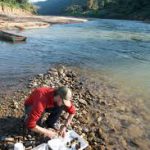The Annual Report highlights the key activities of the past year, and presents the major accomplishments and findings of our global network of researchers in the human dimensions of global environmental change.
To submit Belmont Forum-related news content, please contact us at info@belmontforum.org.
![Arctic Project Group Photo - Source: [Author Unknown]. Image 20140412-081514. Digital Image. [Source Unknown], [Date Published Unknown]](https://belmontforum.org/wp-content/uploads/2017/04/20140412-081514-150x150.jpg)
Through this Call, the Belmont Forum seeks to bring together integrated teams of natural scientists, social scientists, and stakeholders to develop projects that utilize existing Arctic observing systems, data sets and models to evaluate key sustainability challenges and opportunities in the Arctic region across one or more of four possible themes.
![Soil Sample from SMARTS2 Project - Source: [Author Unknown]. Soil Sample. Digital Image. [Source Unknown], [Date Published Unknown]](https://belmontforum.org/wp-content/uploads/2017/04/Fodd-Security-Presenation-Belmont-Forum-COMPRESSED-Soil-Sample-150x150.png)
These awards provide support to transdisciplinary, multinational consortia to engage in global change research through a 14-country joint research initiative supported by the Belmont Forum and the Joint Programming Initiative on Agriculture, Food Security and Climate Change (FACCE-JPI).

Freshwater Security and Coastal Vulnerability Funding Update
December 9, 2013The Belmont Forum/G8HORCs Panel of Experts (PoE) meetings for the Freshwater Security and Coastal Vulnerability themes were held in late March, 2013. PoE recommendations for funding have been transmitted to national funding agencies for final decisions.

Collaborative Research Actions (CRA’s): Submit your Ideas
December 1, 2013The Belmont Forum is a high level group of the worlds major and emerging funders of global environmental change research and international science councils. It aims to accelerate delivery of the international environmental research most urgently needed to remove critical barriers to sustainability by aligning and mobilizing International resources.

Food Security and Land Use Change: Close of Pre-Proposal Submission
December 1, 2013The submission period for pre-proposals has ended. Thank you for your interest in this call for proposals.
![Harvesting Cowpeas Intercrop with Maize - Source: [Author Unknown]. Harvesting Cowpeas Intercrop with Maize. Digital Image. [Source Unknown], [Date Published Unknown]](https://belmontforum.org/wp-content/uploads/2013/12/Harvesting-cowpeas-intercrop-with-Maize-150x150.png)
Urgent Notice for Applicants to the Joint Call on Food Security and Land Use Change
December 1, 2013Due to technical difficulties with the online submission portal, applications will also be accepted via email. The deadline for submitting proposals for the Joint Call on Food Security and Land Use Change is this Monday, September 30th 2013, at 24:00 UTC.

The Belmont Forum announces funding decisions for recent calls on the themes of Coastal Vulnerability and Freshwater Security. These awards provide support to transdisciplinary, multinational consortia to engage in global change research through an 11-country joint research initiative supported by the Belmont Forum and G8 Heads of Research Councils. Consortia are comprised of natural scientists, social scientists and end-users, policy makers, and associated stakeholders. The goal of these research programs is to accelerate delivery of knowledge needed for action to mitigate and adapt to detrimental environmental change and extreme hazardous events within the thematic areas of either Coastal Vulnerability or Freshwater Security.

Update on IOF Theme Programs
April 1, 2013The Belmont Forum/G8HORCs Panel of Experts (PoE) meetings for the Freshwater Security and Coastal Vulnerability themes were held in late March, 2013. PoE recommendations for funding have been transmitted to national funding agencies for final decisions.

Call for Applications: Young Scientists Networking Conference
November 1, 2012The International Social Science Council (ISSC) and the International Council for Science (ICSU), in collaboration with the German Research Foundation (DFG) are hosting a Young Scientists Networking Conference for Post-Doctoral Researchers Interested in Collaboration Between the Social and Natural Sciences.


